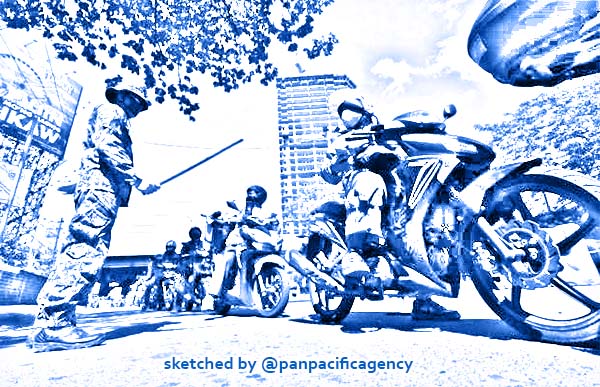Philiipine govt to enforce national ID system to hasten Covid aid distribution

Police checkpoints will remain at borders between cities and towns even if the enhanced community quarantine is lifted and the less restrictive general community quarantine is implemented in several areas of Metro Manila after May 15. (Photo by NIÑO JESUS ORBETA / Philippine Daily Inquirer). Sketched by the Pan Pacific Agency.
MANILA, Jun 6, 2020, The Manila Times. The Inter-Agency Task Force (IATF) for Emerging Infectious Diseases is pushing for the speedy implementation of the government’s national identification (ID) system to streamline relief distribution to vulnerable groups as the country continues to grapple with coronavirus disease 2019 (Covid-19), a Palace official said, The Manila Times reported.
Cabinet Secretary Karlo Alexei Nograles, co-chairman of the IATF, said the implementation of the Philippine Identification System (PhilSys) would allow the government to automatically release assistance to the most vulnerable during national emergencies.
“The Task Force is pushing for an expedited delivery of social services to the most vulnerable groups in the population through the Philippine Identification System (PhilSys) ID cards linked to digital payment systems,” Nograles said in an online speech delivered during the first segment of the Pre-employment Preparation Webinar series conducted by the Far Eastern University Career and Placement Office on Friday.
“Through PhilSys, government will have a more reliable registry of vulnerable persons from all databases, resulting in automatic and universal release of aid during national emergencies without the need for applications,” he added.
Nograles said that even the education sector needed to adapt to the “new normal” through the institutionalization of so-called blended or online learning, flexible learning options such as open high schools, alternative delivery modes and satellites for off-grid areas.
“We’re keeping up with the everyday challenges of Covid-19 and we’re slowly easing in systems that would benefit every Filipino — young and old, student, worker, homemaker, entrepreneurs. Let’s all be positive and supportive. We’re all in this fight together,” he said.
In August, 2018, President Rodrigo Duterte signed into law the national ID system that will harmonize and integrate several government IDs.
The ID card will contain the bearer’s full name, image, date and place of birth, address, fingerprints, and marital status, among others.
The national ID system aims to promote good governance, enhanced governmental transactions, and a better environment for trade and commerce.
The government launched the pilot testing of PhilSys in select areas in the country to register a substantial number of Filipinos.
The program has reportedly been halted due to the Luzon-wide quarantine imposed by the government to prevent the spread of the coronavirus.
Meanwhile, Nograles said that job and employment prospects remained positive even during the Covid-19 pandemic “because some businesses are resilient, remain extremely relevant and are in fact booming despite the prevailing global health crisis.”
These fields, he said, included the health and medical sectors, retail and online services.
“We all need to be persistent and creative. Know what and where to look for employment-wise in these challenging times. No one is immune from the fallout brought by Covid-19,” Nograles said.
“Everyone in both the public and private sector is affected, and our government is doing its best to provide social and economic safety nets,” he added.
The Cabinet secretary also advised fresh graduates to adapt with the demands of the “new normal.”